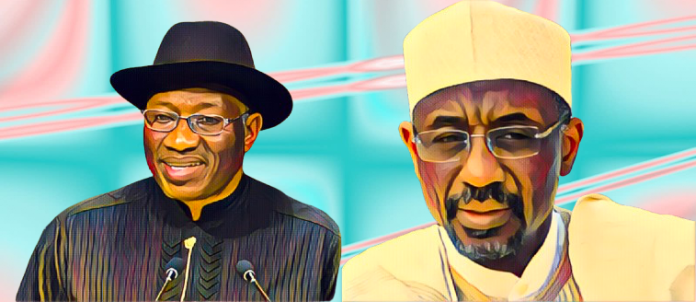KEY POINTS
- Jonathan and Sanusi disagreed over Sanusi’s removal as CBN governor.
- Jonathan argued Sanusi was suspended, not sacked, due to Central Bank expenditure infractions.
- Sanusi insisted he was dismissed for exposing the alleged theft of $49.8 billion.
Former President Goodluck Jonathan and former Central Bank of Nigeria Governor, now Emir of Kano, Muhammad Sanusi II, publicly disagreed yesterday over Sanusi’s removal from office.
Sanusi, in a book co-authored with former Finance Minister Shamsudeen Usman, claimed Jonathan dismissed him after he exposed the alleged theft of $49.8 billion from government coffers during Jonathan’s presidency.
However, Jonathan responded that Sanusi was only suspended due to a query raised by the Financial Reporting Council regarding Central Bank expenditures. He added that had Sanusi’s tenure not ended, he likely would have been reinstated.
Jonathan’s defense against whistleblower claims
Speaking at the launch of the book Public Policy and Agents’ Interests: Perspectives from the Emerging World, Jonathan said, “I do not completely agree with some of the points raised by one of the contributors, but I don’t intend to debate them because he is our royal father, and he is here.
“The claim that he was sacked for blowing the whistle on a $49.8 billion loss to the Federal Government is not correct. He was suspended after the Financial Reporting Council questioned Central Bank expenditures.”
Jonathan noted that there were serious infractions that needed to be addressed, adding, “The timing was such that his tenure ended before we could complete the investigation. Had his term not expired, he likely would have been reinstated.”
Doubts over alleged missing $49.8 billion
On the alleged missing $49.8 billion, Jonathan said, “I remain unconvinced that the Federal Government lost that amount. That year, our budget was $31.6 billion.
“If we had lost $50 billion, how were salaries still paid? How did no one notice? Researchers who contributed to this book should conduct further investigations.”
According to a report by Vanguard, Jonathan also recalled that Sanusi’s initial figure of $49.8 billion later changed to $20 billion and then to $12 billion. “I’m still not sure of the correct figure,” he said.
He pointed to findings from PricewaterhouseCoopers, which investigated the matter and found no evidence of such a large sum missing. However, $1.48 billion was unaccounted for by the Nigerian National Petroleum Corporation at the time.
Jonathan also mentioned that a Senate committee led by Sen. Ahmed Makarfi investigated the claims and found them to be baseless.
During the book launch, Jonathan reiterated that no such funds were lost under his administration, arguing that it would have been impossible to steal such a large sum without the country feeling the effects.
Jonathan also recounted a conversation with then-German Chancellor Angela Merkel, in which he explained that Nigeria, with a $31 billion budget, could not have lost $50 billion unnoticed.
Sanusi’s response and concerns over Dangote Refinery
Responding to Jonathan’s remarks, Emir Sanusi II insisted he had been dismissed over the whistleblower allegations.
“My boss sacked me. I was constructively dismissed,” Sanusi said, adding that he holds no grudges against Jonathan and continues to respect him.
In a separate development, Sanusi expressed concern over what he described as the frustration of the Dangote Refinery project.
He criticized vested interests for impeding the progress of the refinery, which he said should be enabling Nigeria to end fuel imports.
“Instead of seizing this opportunity, we are frustrating it due to vested interests,” Sanusi said, adding that Nigeria has long been held back by “rent-seekers” who enter office only to profit from the state.
Sanusi praised Usman, the book’s co-author and one of his former university lecturers, for his public service, noting that Usman has never been investigated by the Economic and Financial Crimes Commission.
The event also featured the launch of the Shamsuddeen Usman Foundation, founded by Usman’s children to promote education and artificial intelligence in Nigeria.



